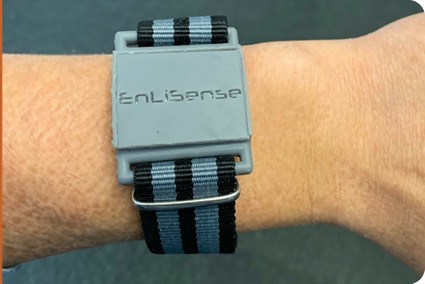A wrist-worn device can accurately measure inflammatory biomarkers in sweat and may eventually be part of the clinical armamentarium for managing patients with inflammatory bowel disease. The device has been tested only in healthy humans to date, but a clinical trial in nearly 70 IBD patients is in the works, researchers said.
The Sweatsenser (EnLiSense LLC) is worn on a strap on the wrist—or any other extremity—where it collects perspiration and records levels of interleukin-1-beta (IL-1-beta) and C-reactive protein (CRP) by documenting the presence of antibodies binding to these molecules. The information is uploaded to a cloud-based app through which clinicians can access the information and use it to guide treatment.
“This device has the potential to allow us to monitor our patients remotely and be able to identify flares early in their course,” said Robert Hirten, MD, an assistant professor of medicine at the Icahn School of Medicine at Mount Sinai, in New York City, who will be participating in an upcoming trial of the sensor. “This would potentially allow gastroenterologists to optimize the treatments a patient is on and to hopefully mitigate a disease flare.”
To assess the accuracy of the device, senior investigator Shalini Prasad, PhD, the head of bioengineering at The University of Texas at Dallas and co-founder of EnLiSense, and her colleagues tested the device in 20 healthy people, comparing its sensitivity and specificity with a conventional serum-based assay for measuring IL-1-beta and CRP. They found that the Sweatsenser was 95% accurate in measuring levels of these biomarkers and able to detect minute volumes of these biomarkers in sweat, with as little as 1 pg/mL.
Prasad said the sensor could ultimately replace blood-based biomarker testing.
“Proactive prognostic monitoring through blood testing can help optimize clinical decisions, but it’s pretty invasive,” she said. “This would be a noninvasive method that providers could use to modulate treatment.”
Badrinath Jagannath, a PhD candidate in biomedical engineering at The University of Texas at Dallas, who presented the results at the 2021 Crohn’s & Colitis Congress (abstract 3495803), said the team is now collaborating on a trial of the device in 68 patients with Crohn’s disease and ulcerative colitis who are receiving treatment at Mount Sinai and the University of Chicago.
“We’re going to compare biomarker levels for active and inactive disease, and also to the healthy cohort we’ve studied here,” Jagannath said. “Using these data, we’ll be able to build a model to predict when a flare-up might occur.”
The device may ultimately have several applications for IBD patients, he said.
For example, in the outpatient setting, it could help predict flare-ups and expedite treatment while “for hospitalized IBD patients, continuous monitoring of inflammatory biomarkers may be useful to evaluate treatment response,” Jagannath said.
Hirten said, “The results and the concept are very promising, but we still need further studies in patients with IBD to see how well the device detects changes in these markers over time, and to determine the impact that continual monitoring will have on disease course.”
Assuming further studies confirm the accuracy and utility of the device, the Sweatsenser could be on the market within three to five years, Prasad said.
—David Wild
Prasad is co-founder of EnLiSense LLC, the private company developing the device. Jagannath and Hirten reported no relevant financial disclosures.
This article is from the May 2021 print issue.


